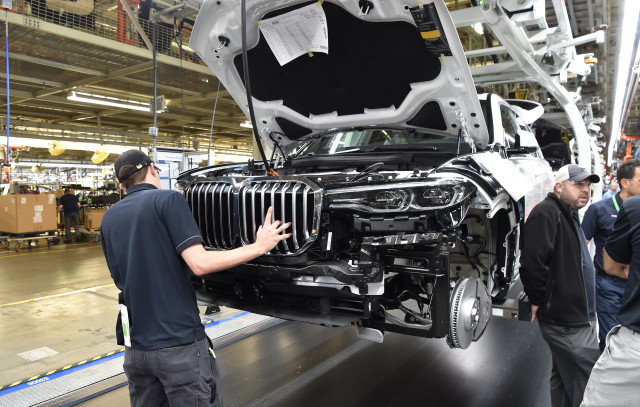BMW will move some SUV production out of US in response to Trump's tariffs
BMW said on Monday that it will move production of some of its SUVs from its Spartanburg, South Carolina, plant to China, according to a report from The Post and Courier.
The move comes in response to a 40-percent tariff on SUVs built in the U.S. levied by China. China's tariffs were retaliation for tariffs imposed by President Donald Trump on $34 billion worth of Chinese products.
China said Trump was starting “the biggest trade war in economic history,” and accused him of bullying with his trade tactics. In addition to SUVs, China placed tariffs on American soy beans and seafood.
BMW signed an agreement with Chinese partner Brilliance Automotive Group Holdings to up the number of vehicles produced in China to 520,000 by 2019, according to the paper. BMW makes the X3, X4, X5, and X6 in South Carolina, where it employs 10,000 people. The report did not say which SUVs would move or if some production of all models would move to China.
Earlier on Monday, BMW announced that the iX3, essentially a battery-electric version of the X3, would be built in China and exported around the world as part of the 520,000 vehicles to be produced in the country by 2019. BMW-owned Mini will also produce electric vehicles in China.
In addition to moving production, BMW will increase prices in China on vehicles imported from the U.S. because it is "not in a position to completely absorb the tariff increases” imposed by China.
The news of BMW's move comes while the Trump administration studies the effect on U.S. national security of imports of European cars, SUVs, vans, light trucks, and automotive parts. Should the administration determine European auto imports pose a national security risk, Trump is set to impose a tariff on them.
Based on the Tariffs and Trade Barriers long placed on the U.S. & its great companies and workers by the European Union, if these Tariffs and Barriers are not soon broken down and removed, we will be placing a 20% Tariff on all of their cars coming into the U.S. Build them here!
— Donald J. Trump (@realDonaldTrump) June 23, 2018
The Department of Commerce will hold a public hearing on the investigation on July 19 and 20 in Washington, D.C.
The European Union has warned that such a move could endanger $300 billion in commerce. A study by the Petersen Institute for International Economics said the move would hike auto prices, threaten spending on autonomous cars, and cost up to 195,000 jobs in the U.S. over three years and up to 624,000 jobs if other countries were to retaliate.

Email This Page